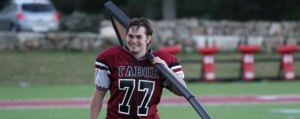 HYANNIS – If this were Paul Houle Jr.’s 15 minutes of fame, he’d be happy to give them back.
HYANNIS – If this were Paul Houle Jr.’s 15 minutes of fame, he’d be happy to give them back.
The 18-year-old Tabor Academy student made news around the world after OneCape Health News broke the story of how Houle’s new Apple Watch may have saved his life.
Houle’s heart rate spiked after football practice but stayed elevated hours later. The heart monitor on his Apple Watch prompted him to alert his trainer, who rushed him to the hospital.
After spending three days at Cape Cod Hospital, Houle was released, but his recovery has been slow. When he first returned to school, he had trouble even walking across campus.
“I have not been cleared for football practice or any physical activity,” Houle told us in a recent interview. “I’m actually going to the health center right now because I’ve noticed that if I sit in a chair for too long my joints ache really badly. I don’t feel as bad as I did, but I definitely don’t feel 100 percent.”
Houle was suffering from rabdomyolysis, a syndrome caused when muscle cells die from overexertion. All exercise causes some muscle cell death, but most people can simply rehydrate, rest a bit and feel fine.
Marcial Santos, MD, who treated Houle at Cape Cod Hospital, says his case was very unusual. Most of the people he sees with rabdomyolysis are victims of car crashes or people using amphetamines. Both cause trauma and stress to the body.
“It is a rare condition,” Dr. Santos says. “We don’t want to panic the general population, but we do want them to be aware of this.”
The danger comes when strenuous exercise is coupled with dehydration and hot or humid weather, as it was in Houle’s case. Even though he was drinking enough water, two football practices on a very hot day caused his muscles to break down, releasing the enzyme creatine phosophokinase (CPK) into his blood stream.
His kidneys couldn’t handle the amount of CPK his body produced.
“He was well on his way to becoming much worse if he didn’t get treatment,” says Dr. Santos. “If the Apple Watch didn’t save his life, it certainly saved him from a very long hospitalization and a very difficult recovery, because the longer the disease goes undetected, the more damage it does to your body and your organs.
Houle’s liver and kidneys were affected, and his heart was in so much stress that it released a protein called troponin often seen with people having a heart attack.
“Could he have died? Absolutely,” Dr. Santos says. “If there was more stress on his heart, he could have had a heart attack. If he had worst kidney disease it could have gotten to the point where it couldn’t be reversed. If it had gone on for several days, he would have ended up in renal dialysis. That’s how bad this could be.”
Fluids—lots of them—are the main treatment for rabdomyolysis. People who get to the point where they can’t rehydrate by mouth need to be hooked up to intravenous fluids immediately.
Dr. Santos says the main signs to watch for with rabdomyolysis are a pounding heart at rest, extreme muscle fatigue and exhaustion.
“If your body stops making urine, that’s a sign that you are really dehydrated and you need to go to the hospital,” he says. “Every hour matters in those cases, even though they are rare.”
Katie Falkowski, owner/head coach at CrossFit Hyannis, learned about rabdomyolysis in both her CrossFit Level 1 Training and her training to be a Certified Strength and Conditioning Specialist.
“Our job is to make people healthy and safe and better,” she says. “And so we learn about rabdomyolysis, not because it happens all the time, but as a preventive thing.”
Her training taught her the warning signs of the syndrome and how to prevent it. In general, she stresses a gradual introduction to the intensities of any sport.
“The people who are at most risk for rabdomyolysis are people who have a previous background in sports or fitness and already have that mindset to push themselves really hard,” Falkowski says. “And then maybe they took some time off before coming back to it. Their body isn’t ready, but their mind knows how to push it.”
“It’s human nature to want to keep up with other people, but knowing your own limits is important,” Falkowski says.
When Apple learned about Houle’s story, the company offered him an internship next summer and gave him an iPhone 6s a day before the newest phone was released to the public.
“I feel sorry for him that he ended up in the hospital, but in the end it was a good lesson for a lot of people about the technology these days,” says Dr. Santos. “It’s comforting in one way that these devices can save people’s life. I’m thinking about buying an Apple Watch myself.”

























Speak Your Mind